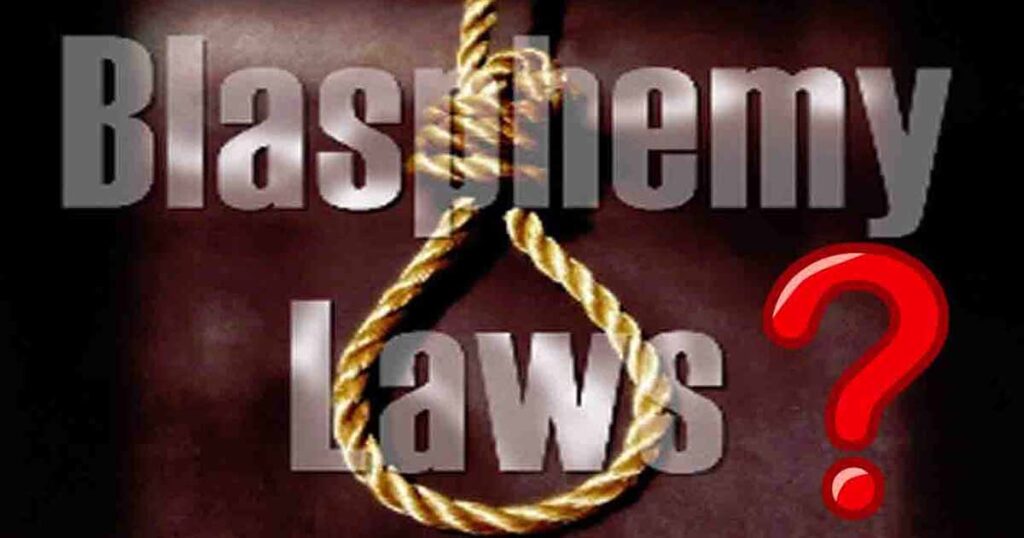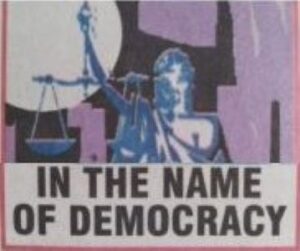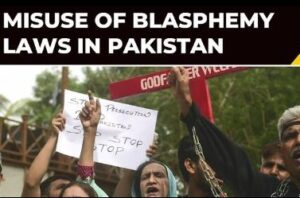The law that targets the innocent

By Shahid Rizvi
“Blasphemy law in Pakistan is blatantly violative of human rights” asserts one Human Rights leader.
“Shall we allow everybody to make derogatory remarks about our Holy Prophet (PBUH) and holy books?” counters a religious scholar.
Where lies the truth?
According to human rights activists laws are framed for protection of the society. Persons and values. But the blasphemy law and Hudood Ordinance have been framed to condemn society persons and values. That is what is happening in Pakistan. The law has unending possibilities of misuse by unscrupulous people. Hundreds of people have suffered at the hands of this law. Even minor children and illiterate persons have been charged with writing derogatory slogans on walls. Even disabled insane and mad people.
Blasphemy is a very sensitive issue. It is instantly igniting the mob In many cases it has resulted in the lynching of the victims. Events have shown that patience have often been excited by vested interests.
In almost all cases the victims were innocent. Wherever proper investigations were conducted, or the courts took notice of the absence of evidence or and uncorroborated evidence, the victims were acquitted. It was found that for settling petty scores, for land and property disputes, or for personal grudges people were blamed for blasphemy.
The charge of blasphemy is the most convenient and effective weapon to per persecute an adversary. Because it triggers mass hysteria, even the police and the court find themselves under mob pressure, so people are forced to arrest the courts to sentence him., at least to a prison term.
For instance, Chand Barket, a bangle seller, was targeted by his business rivals. The complainant in the Gul Masih case was sympathizer Sipah e Sahaba and the man who backed him up and had the FIR registered had a political score to settle with Gul’s elder brother had refuse Christian vote to support him for mayorship. Niamat Ahmer, a teacher was murdered because his colleagues wanted some other teacher in his place. Iqbal Tahor was another teacher who was removed because of this popularity.
Dr Akhtar Hameed Khan, a reputed social worker class faced blasphemy charges because his world-famous Orangi Pilot Project had hit the builders’ community. Manzur Masih, Rehmat Masih and Salamat Masih have a history of minor clashes with their neighbors. Arshad Javed was disabled, yet he was refused bail. Two Christian lawyers yet he defended a blasphemy accused were, themselves stoned and one died. Dr Farooq Sajjad was burnt to death. Professor Dr. Abbas was murdered in Khairpur. Khanewal and Shantinagar cases are very recent where 13 churches were burnt and razed to the ground.
The addition of Section 295 (C) in Pakistan code, has caused all the mischief. Since this amendment came into force 8 people have been sentenced to death and 6 were lynched by the mobs.
The blasphemy law is widely applied to Qadianis. A prohibition is imposed against their rituals. Freedom of conscience, expression belief and worship is non-existence for them. They are virtually chased by fanatics and killed.
This particular law because of its widest scope and vague language is a block to historical research. For instance, an excavation in Israel proved that Moses never travelled the route as described in the Old Testament. But such a statement contradicting the old religious version would be blasphemy under Pakistan law.
It is obviously for its actual and potential misuse that Pakistan’s blasphemy law has attracted criticism not only abroad but also at home from Human Rights groups. Recently the US Government officially suggested to the Government of Pakistan that the law should be repealed.
But is punishable even in the West. However, the law there is so framed as to make any emotional interpretation impossible. Moreover, the masses in the West are literate and not easily roused to hysteria. Even when they have reason to protest, they do not take the law in their hands.
Another factor which distinguishes the West’s attitude towards the issue from the Muslim point of view is that and Islam the Prophet is held in far greater reverence than Christ among the Christians. The latter go to lengths discussing and portraying Jesus in their writings and movies, which for Muslim would be unthinkable. Hence the edict against Salman Rushdie.
Pakistan has denounced US suggestion as interference and in its internal affairs. But that is the most technical and formal view of the matter. Its pith lies in the defects that in here in the present law as demonstrated in its appalling abuse. The narrow interpretation.
Add to that the presently worded blasphemy law and you have a sure recipe for an implosion.
A Vague Law
The blasphemy law is intrinsically defective.
The vagueness of the blasphemy offence in section 295 – C has been succinctly highlighted by farmer Supreme Court judge Dorab Patel. According to him, the use of the word ‘defile’ in the law with the sacred name of the Holy Prophet is quite inappropriate. The expression is generally used where buildings, monuments, or such objects are defaced or corrupted. When this word is used it is assumed that damage does take place. It is grossly improper to assume that anything done by the detractors of the Holy Prophet of Islam, or any other Prophet for that matter, can cause the damage ‘defiling’ connotes.
Besides, the expression can be very widely interpreted, and it is difficult to grade the offence in terms of its severity.
More importantly, Section 295 – C that says makes no reference to Motive, which is a crucial point in criminal law. Justice (Retd) Dorab Patel draws attention to earlier provisions of the Panel Code where the offence is defined in terms of intent.
Section 295 – A takes note of the “deliberate and malicious intention of outraging the religious feelings of any class of the citizens of Pakistan, “Section 297 refers “the intention of wounding the feelings of any person, or of insulting the religion of any person,” Even section 296 – B, inserted by General Zia in 1982, views the desecration of the Holy Quran only when the act is “wilfully” done. But Section 295 – C does not define the offence in term of deliberateness or wilfulness or any other motive to hurt anyone’s feelings. On this score alone the law is defective and liable to abuse.








